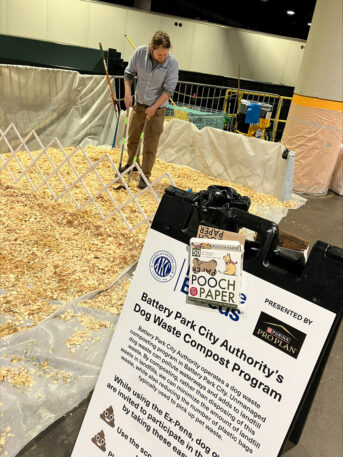1,000 dogs just gathered to meet and greet New Yorkers. Their poop was collected for composting
From 4-month-old puppies to senior canines, about 1,000 dogs assembled in a New York City convention hall last weekend to mingle, play, and get pets from the public. But behind the scenes, one aspect of the American Kennel Club’s 11th annual Meet the Breeds event was slightly different from the past 10 years: the poop. For the first time, a Manhattan neighborhood that regularly composts its dog waste collected the poop accumulated at the event and is sending it to be composted. That will stop it from polluting waterways and releasing greenhouse gases in landfills. At the Javits Convention Center, 135 breeds of good boys and girls convened with breed experts to promote responsible dog ownership. “We like to call Meet the Breeds an educational canine extravaganza,” says Brandi Munden, the American Kennel Club’s VP of public relations and communications. [Photo: Battery Park City Authority] Owners and curious members of the public were able to discover what breeds might be suitable apartment dogs or family dogs; find out how to exercise or play with them; and see rare breeds and their quirky behaviors. And, of course, to pet them. “You walk up and say, ‘Can I pet your dog?’ And the answer is always yes,” Munden says. But 1,000 dogs also means a lot of poop. The event has designated “excrement pens” for dogs to relieve themselves—when they make it, that is. “Sometimes the dogs go where they go,” Munden admits. Instead of collecting poop in plastic bags as they’re accustomed to, owners were directed to use either a provided scoop or newspaper cutting to pick up the droppings and place them in one of the provided receptacles. “Plastic bags not only can’t be composted but are bad for the environment,” says Ryan Torres, VP of park operations for the Battery Park City Authority (BPCA). The method used at the Meet the Breeds event mirrors what the BPCA has been doing in Battery Park City since 2019. Dog owners in that Lower Manhattan neighborhood are used to placing collections in one of eight marked receptacles around the community’s three dog parks. [Photo: Battery Park City Authority] Just like it does with food or garden debris, the authority picks up this waste and prepares it for composting: It removes contaminants, weighs it, and adds other material like leaves or wood chips. It then puts the poop into an enclosed composter, in which conditions are carefully controlled. After about a year, the material is placed in planters, garden beds, and other green spaces. BPCA has collected 8,300 pounds of poop to date, diverting it from landfills, where the poop—and plastic bags—take up space. Dog waste also leaks methane, a greenhouse gas that is 84 times more potent than CO2 and can pollute waterways like the Hudson River. The Meet the Breeds poop will be composted in the same way. The authority picked up almost 90 pounds from the Javits Center and took it to the facility for treatment. “The partnership was really an incredible opportunity to reduce the amount of dog waste ending up in the landfills, but also to connect with our target audience: dog owners,” Torres says. The idea was to raise awareness about the collection and composting process, which also takes place in Williamsburg and Brooklyn Heights in New York, and in other communities across the U.S. and around world. Some municipalities compost cat poop; Seattle’s Woodland Park Zoo composts hippo, rhino, and zebra dung. Munden says dog owners at the event responded well to the new system and would likely be open to having a similar program in their own communities. “We do always care about our dogs, of course,” Munden says, “but we also want to create a better world for them to live in.”

From 4-month-old puppies to senior canines, about 1,000 dogs assembled in a New York City convention hall last weekend to mingle, play, and get pets from the public.
But behind the scenes, one aspect of the American Kennel Club’s 11th annual Meet the Breeds event was slightly different from the past 10 years: the poop. For the first time, a Manhattan neighborhood that regularly composts its dog waste collected the poop accumulated at the event and is sending it to be composted. That will stop it from polluting waterways and releasing greenhouse gases in landfills.
At the Javits Convention Center, 135 breeds of good boys and girls convened with breed experts to promote responsible dog ownership. “We like to call Meet the Breeds an educational canine extravaganza,” says Brandi Munden, the American Kennel Club’s VP of public relations and communications.

Owners and curious members of the public were able to discover what breeds might be suitable apartment dogs or family dogs; find out how to exercise or play with them; and see rare breeds and their quirky behaviors. And, of course, to pet them. “You walk up and say, ‘Can I pet your dog?’ And the answer is always yes,” Munden says.
But 1,000 dogs also means a lot of poop. The event has designated “excrement pens” for dogs to relieve themselves—when they make it, that is. “Sometimes the dogs go where they go,” Munden admits.
Instead of collecting poop in plastic bags as they’re accustomed to, owners were directed to use either a provided scoop or newspaper cutting to pick up the droppings and place them in one of the provided receptacles. “Plastic bags not only can’t be composted but are bad for the environment,” says Ryan Torres, VP of park operations for the Battery Park City Authority (BPCA).
The method used at the Meet the Breeds event mirrors what the BPCA has been doing in Battery Park City since 2019. Dog owners in that Lower Manhattan neighborhood are used to placing collections in one of eight marked receptacles around the community’s three dog parks.

Just like it does with food or garden debris, the authority picks up this waste and prepares it for composting: It removes contaminants, weighs it, and adds other material like leaves or wood chips. It then puts the poop into an enclosed composter, in which conditions are carefully controlled. After about a year, the material is placed in planters, garden beds, and other green spaces.
BPCA has collected 8,300 pounds of poop to date, diverting it from landfills, where the poop—and plastic bags—take up space. Dog waste also leaks methane, a greenhouse gas that is 84 times more potent than CO2 and can pollute waterways like the Hudson River.
The Meet the Breeds poop will be composted in the same way. The authority picked up almost 90 pounds from the Javits Center and took it to the facility for treatment. “The partnership was really an incredible opportunity to reduce the amount of dog waste ending up in the landfills, but also to connect with our target audience: dog owners,” Torres says.
The idea was to raise awareness about the collection and composting process, which also takes place in Williamsburg and Brooklyn Heights in New York, and in other communities across the U.S. and around world. Some municipalities compost cat poop; Seattle’s Woodland Park Zoo composts hippo, rhino, and zebra dung.
Munden says dog owners at the event responded well to the new system and would likely be open to having a similar program in their own communities. “We do always care about our dogs, of course,” Munden says, “but we also want to create a better world for them to live in.”






















